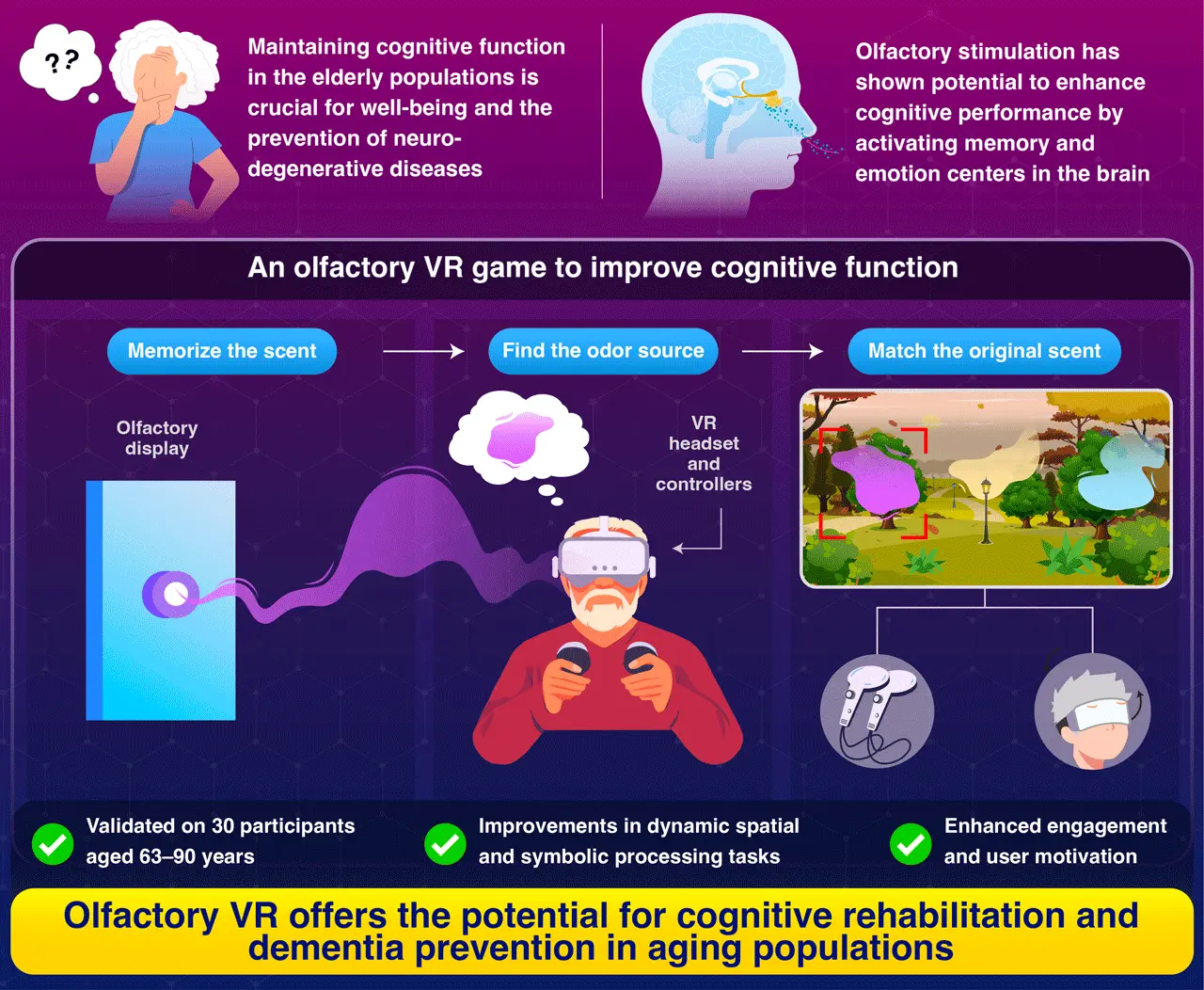A virtual reality game integrating smell to fight cognitive decline
A VR game uses odor cues to stimulate memory and spatial thinking in older adults
Aiming to address age-related cognitive decline, a growing global health challenge, a team of researchers has developed the first VR-based smell-training system to help combat it. This innovative VR game activates memory pathways by incorporating olfactory stimulation in a virtual environment. This game-based method offers an engaging platform for maintaining cognitive function and reducing the risk of neurodegenerative diseases such as dementia in older adults.
Boosting Brain Health in Older Adults with a Virtual Reality (VR) Scent Game

Sunami et al. (2025) | Scientific Reports | 10.1038/s41598-025-94693-9
One promising strategy to counter cognitive decline is through olfactory stimulation—engaging the sense of smell. Smell signals travel directly to brain regions involved in memory and emotion. Building on this knowledge, a joint research team from Institute of Science Tokyo (Science Tokyo), University of the Arts London, Bunkyo Gakuin University, and Hosei University, Japan, has developed the world’s first cognitive training method for older adults by combining olfactory stimulation with virtual reality (VR). The study was published in Volume 15 of the journal Scientific Reports on March 28, 2025.
“VR provides a promising platform to simulate sensory conditions in a controlled yet engaging manner. By combining goal-oriented tasks with real-time feedback, our VR-based olfactory training approach can increase cognitive engagement and maximize its therapeutic impact,” says Professor Takamichi Nakamoto from Science Tokyo.
The method involves an olfactory display that emits specific scents during immersive VR gameplay, activating memory- and emotion-related brain regions. In the activity, participants are asked to memorize and later match scents within a virtual environment. The experience begins in a virtual landscape. Using a VR controller, participants interact with a scent source represented by a stone statue. When touched, the statue releases a specific scent, accompanied by a white vapor cloud as a visual cue to reinforce memory.
Participants then explore the virtual landscape to locate a scent source. As they move through the landscape, the olfactory display emits subtle traces of the scent to guide them to the location. Upon reaching the odor source, shown as a stone lantern, they encounter three colored vapor clouds, each emitting a different scent. Their task is to compare the smells and identify the one that matches the original scent they memorized.
“The smell memory phase strengthens odor recognition and memory encoding by linking the olfactory stimulus with a visual cue. The navigation phase challenges players to integrate spatial navigation with odor recognition while retaining memory of the initial scent. The final odor comparison phase engages olfactory discrimination and working memory retrieval, reinforcing cognitive function,” explains Nakamoto.
The activity led to noticeable cognitive improvements in 30 older adults aged 63 to 90. After just 20 minutes of playing the VR game, participants showed improvements in visuospatial rotation and memory. Visuospatial processing and cognitive function were assessed through different tasks. In the Hiragana Rotation Task, where they had to decide if rotated Japanese characters matched the original, scores improved from 19–82 to 29–85. In a word-based spatial memory recall task, where participants memorized word positions in a grid, scores rose from 0–15 to 3–15. These improvements were validated through statistical analysis.
With continued research and development toward more affordable olfactory displays or alternate scent delivery methods, olfactory-based VR activities could become an accessible and engaging tool for supporting mental health in older adults.
Reference
- Authors:
- Ryota Sunami1, Takamichi Nakamoto1,2, Nathan Cohen3, Takefumi Kobayashi4 and Kohsuke Yamamoto5
- Title:
- Exploring the effects of olfactory VR on visuospatial memory and cognitive processing in older adults
- Journal:
- Scientific Reports
- Affiliations:
- 1School of Engineering, Institute of Science Tokyo, Japan
2Institute of Integrated Research, Institute of Science Tokyo, Japan
3Central Saint Martins, University of the Arts London, UK
4Faculty of Human Studies, Bunkyo Gakuin University, Japan
5Faculty of Science and Engineering, Hosei University, Japan
Related articles
Further Information
Professor Takamichi Nakamoto
Institute of Integrated Research, Institute of Science Tokyo
Contact
Public Relations Division, Institute of Science Tokyo
- media@adm.isct.ac.jp
- Tel
- +81-3-5734-2975